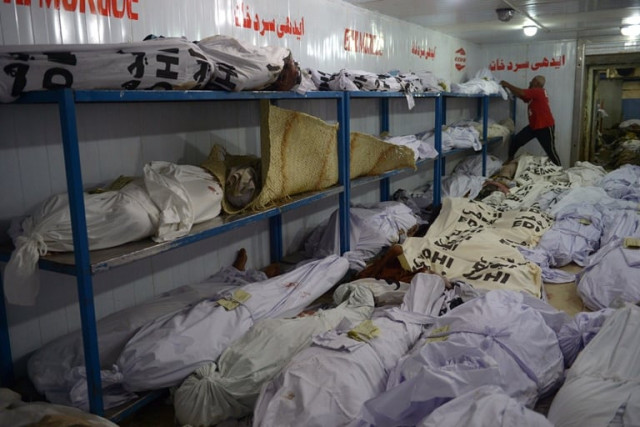Counter-argument: KE claims it is not responsible for heatwave deaths
The petitioners had asked the court to declare the privatisation of KE void

Bodies seen lying in an Edhi morgue after the killer heatwave. PHOTO: FILE
Headed by Justice Syed Hasan Azhar Rizvi, the division bench was hearing an intervener plea jointly filed by singer Jawad Ahmed, the Pakistan Fisherfolk Forum, the Tehrik-e-Niswan and the Ajrak Social Welfare Society.
A group of non-government organisations had filed a petition, pleading to declare the privatisation of the power utility void following hours-long power cuts during the heat wave that resulted in the deaths of more than 1,300 people in the city in June.
Read: Karachi heatwave death toll crosses 1,200: Health Department
Meanwhile, the KE management filed its comments, denying that it was to be blamed for the tragic deaths or injuries. Referring to various news reports, the power utility said there was no communication by any government authority or department giving any forewarning as to the extent of the heat wave.
Secondly, a majority of those who passed away were homeless. Thirdly, it has not been established that there was a direct correlation between the load shedding and deaths. “Had this been the case, areas such as Sibi and Larkana, where the load shedding regimes are much higher and the temperature reached 49 degrees centigrade, would have seen more deaths, which is clearly not the case,” said the report. “However, the fact that this did not happen is proof that there is no correlation between the deaths caused by the heat wave and the alleged lack of electricity/load shedding.”
Read: Feeling the heat, Taliban threatens K-Electric against power outages
The KE management insisted that load shedding was reduced during the peak of the heat wave from the beginning of Ramadan, whereas the maximum load shedding prior to the month was 7.5 hours (in some areas). “At present, approximately 60 per cent of the city of Karachi is exempted from load shedding and this includes the industrial areas, which are the backbone of the commerce and industry in our metropolis,” the power utility maintained. It claimed that the 143 hospitals were exempted from load shedding throughout the city.
Claiming to have improved the system, KE maintained that it had reduced the losses of transmission and distribution, which were taking place due to illegal abstraction of electricity, theft or otherwise, from 36 per cent to 25.3 per cent till June 30, 2014.
This figure has been further brought down by June 30, 2015 to approximately 23.7 percent.
Published in The Express Tribune, August 1st, 2015.



















COMMENTS
Comments are moderated and generally will be posted if they are on-topic and not abusive.
For more information, please see our Comments FAQ